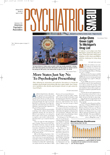This year’s good news—relatively speaking—about Medicare fees will not extend into 2004; in fact the federal Centers for Medicare and Medicaid Services (CMS) is predicting that Medicare payments next year will be cut by 4.2 percent.
One of the first organizations to react to the news was the AMA. “Today’s announcement of more Medicare payment cuts is proof positive that Medicare’s physician payment formula is fatally flawed and must be replaced,” said APA President Yank D. Coble Jr., M.D. “Under the current payment formula, physicians are penalized if services to Medicare patients grow more rapidly than the gross domestic product. At times of slow economic growth, it is likely that Medicare spending on physician services will exceed the target and trigger cuts in physician payments.
“The health care needs of America’s seniors don’t change with the ups and downs of the U.S. economy,” Coble continued. “Patients and physicians lose under a formula that cuts Medicare payments when the overall economy slows and when more health care services are provided to seniors. Under these conditions, the only way physicians can avoid payment cuts is by limiting care to our nation’s elderly and disabled.”
According to the AMA, the CMS report suggests that despite a 5.4 percent physician reimbursement cut in 2002, spending for physician services to Medicare patients has been growing at an annual rate of 7 percent.
“Clearly, Medicare patients are using more health care services, which isn’t surprising,” Coble said. “The Department of Health and Human Services [HHS] itself has previously identified several factors that encourage greater use of Medicare physician services, including an aging population and development of new drugs to treat chronic illnesses commonly found in the elderly.
“HHS itself has contributed to growth in physician services with new, worthwhile initiatives: government-sponsored medical research, Medicare quality improvement initiatives, new disease-screening benefits, CMS coverage expansions, and efforts to reduce health care disparity. These policies increase demand for medical care, but they have been good for our nation’s seniors. . . .Improvements in the health and life expectancy of our nation’s seniors have a cost attached, and the physicians of America should certainly not be penalized for these important achievements. Unless we change the physician payment formula, Medicare payments to physicians will continue to plummet, making it more difficult for our nation’s seniors to get the health care they need and deserve.”
